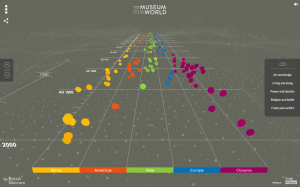 The Art Museum in the Digital Age (Vienna, 14-15 Jan 21)
The Art Museum in the Digital Age (Vienna, 14-15 Jan 21)
Wien, Österreichische Galerie Belvedere, 14. – 15.01.2021
Deadline: Sep 1, 2020
The Art Museum in the Digital Age – 2021
The Belvedere Research Center organizes its third international conference on the digital transformation of the art museum. The 2021 edition will focus on online collections and the re-contextualization of the museum object in the digital universe.
During the COVID lock down, the call for online availability of museum objects became louder. Many museums responded immediately by putting existing content online and introducing tools to enable virtual visits. This push again highlights the potential of online collections: they allow both expert and lay audiences to explore and enjoy the collection, either as a goal in itself, or as a means to plan a visit. However, the value, or at least the usability, of the digitized materials (i.e., images and information) in the web’s massive eco-system depends to a large extent on their uniqueness and trustworthiness.
Following this rationale, the two-day event will gather contributions addressing primarily – but not exclusively – the following topics.
The museum as a digital knowledge repository
The museum’s nucleus is its collection. All activities gravitate toward it. Even in a “world of virtual communication,” the “museum’s authenticity […] lies undaunted in the material artefact,” as media theorist Wolfgang Ernst stressed in 2012. The digitization of museum objects thus aims to generate sustainable surrogates that are accessible 24/7. As a consequence, the collection is transformed into an information repository that can serve multiple purposes for multiple audiences.
Papers can address the digital mediation of museum content as well as the opportunities and challenges of digital strategies. Analyses and case studies on the manifold possibilities and methodological approaches of digitization, visualization and gamification of collections, documentation, indexing, contextualization, annotation, and archiving in the digital realm are also welcome. What role do interactive formats play in audience development? Is the use of digital media seen as an obstacle to the aesthetic perception of the original? Image-viewer-relationships would also need to be examined more closely in this regard. To what extent do the qualities of perception differ from originals, their digital surrogates and possible virtual extensions? Is an aesthetic experience of artworks in the digital space possible at all? What are the options and limits of knowledge formation? Can cultural phenomena and historical processes ultimately be made visible by means of databases? What is the potential of digital collections or their virtual presentations?
The Online Collection – a matter of access
The digital documentation of cultural heritage can be seen as basis for a universal memory, provided it is readily (and freely) accessible. Thus, the digitization of the collection requires at the same time rapid, uncomplicated, but also free and open access for different audiences as well as educational, research and cultural institutions. Open content programs support “intellectual and creative freedom” and create “transparency, participation, resonance and appreciation” (Bernhard Maaz, Das gedoppelte Museum, 2020). In order to become embedded in the semantic web, the latest technologies and data standards are used, enabling links between diverse systems. Machine readability, artificial intelligence and efficient re-use by various platforms and devices are being developed.
Papers can address digital workflows, infrastructures, internal and external processes or applications and may raise epistemological questions. Why is a theoretical foundation for an open digital museum needed? Is there a danger that new technologies will take on a life of their own and determine content? Given the sharing of data and participatory formats: where does the museum space begin and end? What does this mean in legal terms? What kind of questions does the use of Artificial Intelligence in museums raise? What role does digital accessibility play?
We look forward to receiving your proposals for topics in the fields of museum/museology, art and cultural history, media studies and digital humanities. Please send your abstracts for a 20- to 25-minute presentation in German or English (max. 250 words), including a short biography with complete contact information as one PDF document until September 1, 2020 to: j.aufreiter@belvedere.at
Prof. Ross Parry (University of Leicester) was requested as keynote speaker.
Conference Committee: Johanna Aufreiter, Christian Huemer, Ralph Knickmeier, Georg Lechner (Österreichische Galerie Belvedere, Wien), Koenraad Brosens (KU Leuven)
Conference Languages: German & English
Conference Partners: Museumsbund Österreich, ICOM Österreich
Travel and accommodation costs can be reimbursed to a limited extent for speakers. Conference participation is free of charge.
Note: Due to the constantly changing situation caused by the coronavirus pandemic, the possibility of an online conference if required is being considered.
Hashtag: #digitalmuseum

Leave a Reply
You must be logged in to post a comment.